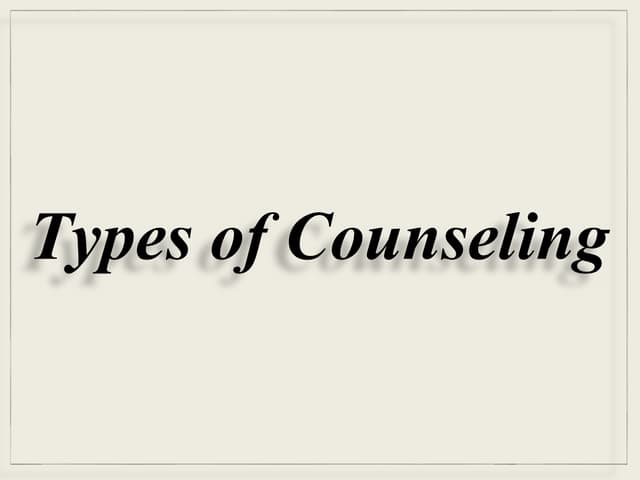A Comprehensive Overview to the Different Types of Therapy and Their Impact
Counseling incorporates a selection of restorative techniques, each developed to meet unique mental health needs. From the structured techniques of Cognitive-Behavioral Therapy to the empathetic nature of Person-Centered Treatment, these techniques provide distinct paths to individual growth. Family members treatment and Dialectical Behavior modification give extra frameworks for recovery, while group therapy fosters community assistance. Understanding these varied techniques can brighten their profound influence on private well-being. What continues to be to be discovered are the ins and outs of each method.

Understanding Cognitive-Behavioral Therapy (CBT)
Although many restorative strategies exist, Cognitive-Behavioral Therapy (CBT) attracts attention as a result of its organized, ambitious nature. This type of therapy is based on the premise that thoughts, sensations, and actions are adjoined, and by altering unfavorable thought patterns, people can modify their psychological actions and actions. CBT employs various strategies, such as cognitive restructuring, which assists clients identify and test altered beliefs. Behavioral activation encourages engagement in pleasant activities to fight depression.
Normally, CBT is a temporary treatment, commonly long lasting in between 12 to 20 sessions, making it available for those seeking quick outcomes. Its performance has actually been well-documented in dealing with anxiousness conditions, anxiety, and various other psychological health problems. The therapist's function is to guide customers with workouts and research projects, fostering self-awareness and advertising long-lasting coping techniques. This sensible approach encourages individuals to take control of their psychological wellness, ultimately resulting in improved life complete satisfaction.
Exploring Person-Centered Therapy
Person-Centered Treatment, established by Carl Rogers, uses a different method to Cognitive-Behavioral Treatment by emphasizing the customer's subjective experience. This healing design focuses on the person's point of view, cultivating an environment of empathy, unconditional positive regard, and credibility. By permitting clients to discover their sensations and thoughts without judgment, specialists facilitate individual development and self-discovery.
The core tenet of Person-Centered Therapy is the idea that individuals have the intrinsic ability for self-healing and personal advancement. In this setup, the specialist acts as a helpful overview instead than a directive authority, encouraging customers to organize their own trip. This approach is specifically effective for those coming to grips with problems such as low self-confidence, stress and anxiety, or anxiety, as it equips them to challenge and comprehend their emotions. Inevitably, Person-Centered Treatment grows a solid restorative alliance, fostering count on and visibility essential for purposeful modification.
The Function of Family Therapy in Recovery
Family members treatment functions as a vital element in the recovery procedure for people and their relationships. This healing technique concentrates on improving communication, solving problems, and promoting deeper links among relative. By dealing with inefficient dynamics, family treatment motivates each member to share their ideas and sensations in a safe atmosphere, advertising understanding and empathy.

The influence of family members treatment expands past the sessions, as enhanced partnerships can lead to enhanced psychological health for all included. Generally, household therapy plays a crucial duty in recovery by cultivating unity, resilience, and mutual assistance among member of the family, inevitably assisting them towards a much healthier, more meeting life with each other.
Unboxing Dialectical Behavior Modification (DBT)
Building on the foundation of healing approaches that boost emotional wellness, Dialectical Behavior modification (DBT) uses a structured framework for people battling with intense feelings and behavior challenges. Created by Marsha Linehan, DBT incorporates cognitive-behavioral methods with mindfulness methods, aiming to aid customers handle frustrating sensations and enhance social effectiveness.
The treatment is especially helpful for those diagnosed with Borderline Personality Problem but is likewise suitable to a series of various other psychological health concerns. virtual therapy. DBT contains private treatment sessions and skills training groups, concentrating on four vital capability: mindfulness, distress resistance, feeling guideline, and interpersonal efficiency
The Benefits of Group Counselling Sessions
While individual treatment supplies valuable insights, team therapy sessions provide one-of-a-kind benefits that can substantially improve the restorative experience. One vital benefit is the sense of neighborhood that emerges among participants. Individuals frequently find comfort in sharing their experiences with others dealing with comparable difficulties, fostering a supportive setting that minimizes sensations of isolation.
Group sessions motivate diverse point of views, enabling participants to find out from each various other's coping strategies and understandings. This cumulative wisdom can bring about improved analytical capabilities and a broader understanding of personal problems.
Additionally, team counseling typically advertises responsibility, as members inspire one an additional to seek their goals and follow their commitments. The cost-effectiveness of group treatment makes it an accessible alternative for lots of people seeking assistance. Overall, the collaborative nature of group therapy adhd counselling sessions can greatly enhance the healing trip.
Regularly Asked Questions
What Credentials Do Specialists Need to Practice Therapy?
Therapists commonly need an appropriate degree in psychology or therapy, in addition to supervised clinical experience. Furthermore, they have to get proper licensure or certification to exercise legally, making certain adherence to professional requirements and moral standards.
Just how Do I Choose the Right Sort Of Therapy for Me?
Selecting the ideal sort of therapy includes evaluating individual demands, checking out numerous techniques, considering therapist specialties, and seeking referrals. Understanding specific objectives and choices can greatly boost the effectiveness and complete satisfaction of the therapeutic experience.

Are Online Therapy Procedure as Effective as In-Person Ones?
The efficiency of on the internet therapy sessions compared to in-person ones commonly relies on private choices and scenarios. Study shows that both techniques can produce positive end results, though some might discover higher convenience in face-to-face communications.
How Much Time Does Counseling Usually Last?

What Should I Anticipate During My First Counseling Session?
Throughout the very first therapy session, customers can anticipate an introduction, discussion of their concerns, facility of objectives, and a summary of the counseling process - relationship therapy. This first conference aims to develop relationship and guarantee comfort